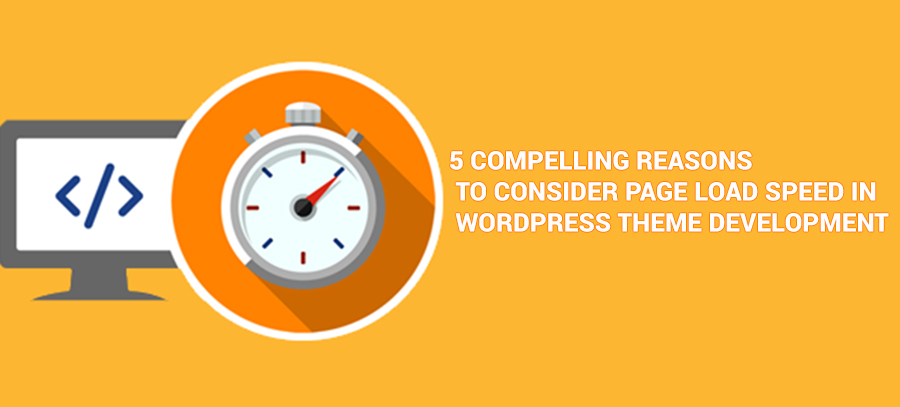5 Compelling Reasons to Consider Page Load Speed in WordPress Theme Development
Page load speed has far-reaching consequences. Many factors affect page load speed. The choice of host and the plan will have a direct impact. There is no dearth of cheap webhosting plans and most small to medium companies, bloggers and startups opt for the affordable starter plans.

These plans have limited bandwidth and that slows down the load speed. The lightest websites may still load relatively quickly. Heavier websites will take a long time. There are many websites in this day and age that do not load at all owing to server issues.
The webhosting plan can always be upgraded or a new webhost can be hired to have a quicker page load speed. However, if the problem lies in the WordPress theme, then changing webhost or hosting plan may not be the answer.
Many elements in WordPress themes can adversely affect the page load speed. Using extremely large images that are obviously heavier, having external embedded media, incompatible plug-ins or heavy integrations, incompatibility pertaining to certain browsers, having too many ads and widgets or the theme in its entirety may be the problem.
All these elements need to be checked. Instead of running the risk of having a slow loading website after its launch, one must be proactive during the theme development and it is necessary to conduct all tests to ensure the website loads as quickly as possible.
If you are wondering whether or not the load speed will affect the impact your website has, then better read on because WPisLife provided these five compelling reasons to consider page load speed in WordPress theme development or any web development in general.
Internet Users won’t Stick Around
Internet users, especially those accustomed with high speed broadband or efficient wireless networks, will not be patient and they will not stick around for a website to load. There are many studies that have inferred attention spans of the millennial generation having dropped to eight seconds.
They would only focus on something for that long before they decide if what they are exploring is worthwhile or interesting enough. Then they would switch to something else. Even if one waits longer than eight seconds for a website to load, just how long would one be considerate.
The most popular websites in the world today, which are also the highest ranking sites, load in less than a second and some may take a second or two. Videos may take longer to load but a webpage should be up there on the browser in less than five seconds for an internet user to still be interested in exploring the website.
Page Load Speed affects Google Search Results
Google is the largest search engine in the world. As someone who owns a website or manages one, you would invariably want the website to rank well and find a place on the first page of Google search results for the targeted keywords in the chosen niche.
This will not happen if the page load speed is dismal. Google likes websites that load quickly. Over the years Google has taken many steps to ensure users have a satiating experience. Many updates have been rolled out to ban sites that use shady optimization practices.
Google has constantly harped on the importance of original and helpful content. The search engine giant does not prefer unsecured or virus infested websites. Likewise, it does not improve the rank of websites that are too slow.
Some Users will have Poor Internet Speeds
A website is not necessarily visited by people having reliably fast broadband connection or wireless networks with sufficient bandwidth. There are people who have access to internet with limited bandwidths and there can always be dips in speeds in rural areas or for people on the move.
Heavy websites or any webpage that is anyway slow to load will become slower for such users. It is not pragmatic to have a section of the target audience struggle to access the website. Any WordPress theme development should not be approached thinking of the positives but also factoring in the potential problems that users, hosts and webmasters may have to deal with.
Mobile Internet is Slower than Broadband/Wi-Fi
People will always use wireless internet when available but many will use their mobile internet to browse a website. Mobile internet or data speed is slower than broadband or wireless networks. If a website is optimized for a desktop and a mobile audience then it cannot be heavy or loaded with too many ads, videos and large images.
The website needs to be responsive and for that it has to be light enough. It is actually the theme development that will determine how light and responsive a website is. This is not dependent on the webhost or choice of webhosting plan. Even the best plan may be insufficient if a website has inherent or foundational issues caused by crappy coded themes.
Faster Websites have Better Conversions
Most websites have call to actions, which could be outright sale or lead generation. If a website loads slowly, it is also going to be slow when someone browses it. Considering the possibility that a person would wait for a website to load, she or he would most certainly have a frustrating experience browsing the website. This will discourage people from signing up or buying something from the site.
